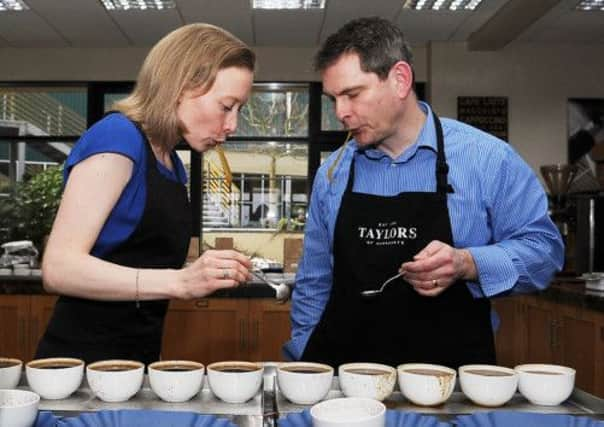Yorkshire ensures coffee does not become a has bean


Tea may still be king for many of the nation’s households, but the surge in coffee’s popularity since the mid-1980s has seen a multi-million pound market emerge with an eclectic mix of brands to satisfy every taste.
But the future of coffee production is not as assured as many might believe.
Advertisement
Hide AdAdvertisement
Hide AdSome of the country’s most successful coffee makers are now having to draw up contingency plans to protect their supply chains as climate change starts make an impact on crop yields.
Coffee buyers at Taylors of Harrogate confirmed they have analysed long-term weather forecasts stretching as far ahead as the next 40 years as they face mounting challenges to continue production amid increasingly volatile meteorological conditions.
Rick Tingley and Hannah Eatough are among the most highly-skilled coffee tasters in the world after they both achieved the Q Grader qualification from the Coffee Quality Institute in America.
There are over 1,000 Q Graders worldwide who have passed stringent exams to test their sensory skills.
Advertisement
Hide AdAdvertisement
Hide AdResearch has identified that there are 850 different compounds in coffee.
Mr Tingley joined Taylors of Harrogate eight years ago as the firm’s coffee buying manager, and admitted there is a growing need to look to contingency plans.
Changes in climatic conditions has meant that harvests are being undertaken at different times of the year, while a fungus called coffee rust is threatening crops in some of the major coffee-growing countries.
Mr Tingley said: “We are undoubtedly seeing changes in weather patterns around the world, and this in turn is affecting crop yields and the times when they are being harvested.
Advertisement
Hide AdAdvertisement
Hide Ad“We are being proactive and planning ahead to ensure that we can continue to have a secure supply in future years.
“We want to continue to work with our existing suppliers, and we will continue to make every effort to do so.
“But there are emerging markets elsewhere in the world which we may have to consider in the future if we cannot get the supplies we need.”
The company has developed a sustainable sourcing programme through its close ties with tea and coffee growing communities in Africa and Asia as well as Central and South America.
Advertisement
Hide AdAdvertisement
Hide AdThe firm deals with producers in 17 countries, but its coffee buyers are facing a series of challenges.
As well as changing weather patterns, many of the countries that supply coffee are embroiled in political unrest which has threatened to affect overseas trade routes.
Staff at Taylors of Harrogate are, however, attempting to help coffee producers cope.
Farmers in Uganda were having difficulty drying coffee beans on a patio due to increasingly wet weather, so the Yorkshire company helped build a retractable roof to provide protection from the torrential downpours.
Advertisement
Hide AdAdvertisement
Hide AdMiss Eatough, who joined Taylors of Harrogate as a graduate trainee in 2004 and is now a coffee buyer, said: “We are working with new sources and new origins for our coffee.
“It is about investigating crops and yields for new coffee, but also risk management with so many different variables which can affect our supply chains.”
But the threat remains from problems such as coffee rust, which has led to countries including Guatemala, Honduras and Costa Rica declaring national emergencies.
Coffee rust causes trees to lose their leaves, resulting in fewer beans of inferior quality.
Advertisement
Hide AdAdvertisement
Hide AdThe fungus has blighted about 70 per cent of the national crop in Guatemala, where coffee is the main export.
Coffee growers in the Central American country have warned hundreds of thousands of jobs could be lost.